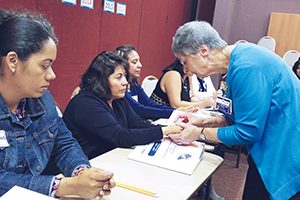By KATHLEEN NELSON
Low-income Hispanic immigrants face hurdles accessing health care. In Portland, Ore., Providence Health & Services combines parish-based telemedicine and a robust health promotores program to deliver basic care, information and screenings to that medically underserved group.

Sr. Lynda Thompson, SNJM, right, prays with a woman training to be a health promotore. Sr. Thompson directs mission integration for Providence St. Vincent Medical Center in Portland, Ore.
Providence Oregon's community health division started its parish-based Telehealth Clinics with Promotores program in 2014, and through 2018 provided screenings and basic health care to almost 3,000 Latinos in the Portland area. A survey conducted by Providence found that, if not for these free clinics, more than 1,000 of those patients would have done nothing about their health concerns.
Providence has made a six-year commitment to the program, and patient acceptance has continued to build. "The duration of this program has been key," says Joe Ichter, senior program manager for Providence's community health division. "It's tough to build trust in a short burst. The fact that it's entrenched in the community is what gets us the results."
The parish setting alleviates fears of patients who may stay away from other provider sites out of a reluctance to give personal information regarding their immigration or insurance status. In fact, notes Antonio Gomez, program manager of community health promotion for Providence Oregon region, health promotores who do the patient intake at the clinics do not ask questions related to immigration status or insurance coverage.
"Parishes have become a safe place for community members," and the clinics are under that halo, Gomez says. The parishes "are a gathering place and have turned into a home" for Latino parishioners. That sense of a safe haven has contributed to the success of the Telehealth Clinics with Promotores program. From 2014 through 2018 promotores screened 2,970 patients. Nurse practitioners provided 626 patient consults, 222 referrals to other primary care providers and 202 prescriptions. Nurse practi-tioners also collaborated with the promotores to apply for and enroll 208 patients in free or reduced-price prescription programs.
Trusted influencers
Providence has had a health promotores program in the Portland area since 2002. Over the years, it has trained volunteers from 16 parishes to provide practical information about care access, wellness and disease prevention to their fellow parishioners. Based on a care model developed in Latin America, the promotores have strong connections in the community, but they are not professional clinicians. Ranging in age from 20 to 70, the promotores receive 80 hours of training from the Providence Oregon region community health division to become trusted links to social services and health care resources for their neighbors.
"They are part of the parish and community," Gomez says. "They share the struggles and the goals of the community. They have built trust through other parish activities, so the patients know them outside health care. They use that trust to help people in need of medical services receive a level of basic care they would not otherwise have."
Each of those 16 parishes now has at least one annual Telehealth Clinic with Promotores; most host two to three annually. Most clinics are scheduled for Saturdays to accommodate working adults.
In the clinics, promotores take patients' height and weight and calculate body mass index. They check blood pressure and take a blood sample, which they insert into a testing machine to measure cholesterol (HDL and LDL), triglycerides and glucose. Results are available within 10 minutes. Promotores review the results with patients and discuss ways to reduce health risks. Patients with readings outside the normal range are given the option to make an appointment for a virtual visit with a nurse practitioner or get a referral to another primary care provider for a face-to-face consult.
Intimacy at a distance
The e-medicine component of the clinic program operates through Providence Express Care Virtual. A promotore stays with the patient during the virtual visit to translate and advocate for the patient.
Thanh Nguyen, a nurse practitioner and senior manager of Express Care Virtual's clinical operation, said she and her colleagues were surprised that some patients preferred the virtual visits to a brick-and-mortar clinic. "At first, I thought it was the newness of the technology, but the extra distance can also create comfort for patients," says Nguyen. "And with the promotores there, people feel at home when they come to the visits."
Nguyen noted that some patients who might have been unwilling to discuss their mental health, or other medical conditions in a face-to-face visit, were more apt to broach those matters in a virtual visit when the clinician was not physically in the room.
Nguyen says that as a clinician she is touched by the opportunity to make a difference in the lives of vulnerable people. "I get tearful when I see a family come to us, even if they are afraid because they have no resources," Nguyen says. "Having the connection with us is just the beginning to open up all our other resources to them. I'm grateful for the opportunity to serve them and hear, 'I'm so glad you're here.'"
Over the years Providence's community health division has trained more than 400 promotores, some of whom have become certified as community health workers. About 150 remain active as volunteers in their parishes, 120 of them women.
"Most are working community members, raising families, caring for their own children," says Delfina Hernandez, program specialist from Providence's community health division. "In the limited amount of time they have to volunteer, they are very passionate and really see the need" for community health outreach. The promotores understand how socioeconomic factors such as income, education and housing affect health status and keep people from accessing health care.